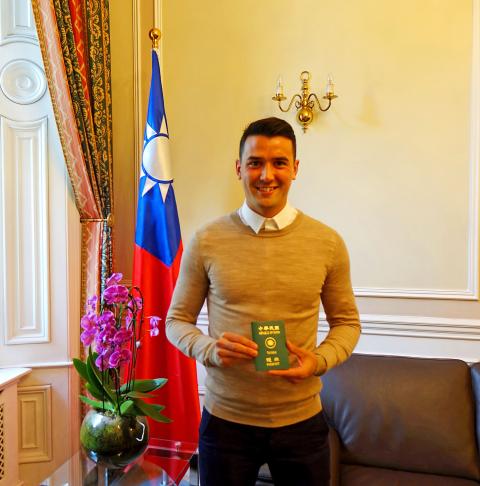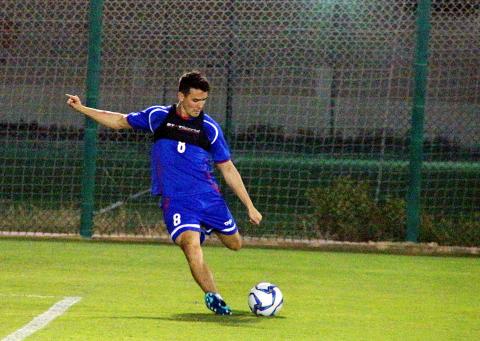As trips to play in an international soccer match go, Tim Chow’s (周定洋) must rank as one of the more unusual. All the more so because, having traveled from the chilly Highlands of Scotland to the humid hills of Taipei to make his eagerly anticipated home debut for the national team, he was told he wasn’t playing.
Chow’s journey into the Taiwan side has been long and tricky. The 24-year-old, who plays for Ross County in the Scottish Premiership and is eligible for selection for Taiwan through his grandfather, is one of only two first-team regulars from the upper echelons of a European soccer league to have played for the national side.

Photo: CNA
The other one is Brussels-born Xavier Chen (陳昌源), who made his international debut in 2011 while at Belgian side KV Mechelen. A third player, Will Donkin of English Premier League side Crystal Palace, has also played for Taiwan recently but has so far only played for his club's Under-18 team.
The introduction of the likes of Chow, Donkin and Chen, as well as the appointment of English head coach Gary White, have helped propel the national team to its best run of form in years. Midfielder Chow is the sort of player around which further success could be built.
LONG JOURNEY

Photo: CNA
His grandfather Chou Yong-kang (周永康) was born in Shanghai, China, and lived in Ningbo before moving to Taiwan. A merchant seaman, he ended up in the English port city of Liverpool where he met and married Chow’s grandmother, Betty.
Although his grandfather passed away years ago, Chow remembers him well.
“My fondest memories are going to his house and finding him in the kitchen. He was a fantastic chef,” Chow says.
Joining his local club Wigan Athletic at the age of 10, Chow made his first-team debut in April 2015, subsequently signing for Ross County in 2016.
He was only 17 when the prospect that he might one day play international soccer became apparent after Taiwanese soccer agent Ginola (吉諾拉) contacted him and suggested he consider the possibility of following in the footsteps of Chen and play for Taiwan.
The two kept in touch, but it wasn’t until last year that Chow, along with his father, was able to visit Taiwan for the first time.
“Straight away the two of us were blown away ... It was like love at first sight.”
Making the decision to play for Taiwan was much easier for Chow than the process of obtaining the ROC passport that would turn his dream into a reality. Hunting down documentation pertaining to his grandfather and submitting the relevant paperwork proved an onerous task.
However, after help from, among others, then-minister of foreign affairs David Lee (李大維) and Minister of the Interior Yeh Jiunn-rong (葉俊榮), he received a call in October last year telling him to get to the Taipei Representative Office in London as soon as possible to pick up his passport.
His eligibility to play in an AFC Asian Cup qualifier in Turkmenistan the following month was confirmed just in time and Chow duly made his international debut in Balkanabat. He describes it as the proudest moment of his career, no idle claim for someone who has played for the club he supported as a boy and has appeared in front of 50,000 fans in Scottish Premiership fixtures at Celtic and Rangers, two of the giants of the British game.
“As a child all I dreamt of was becoming a professional footballer. I sacrificed everything to put myself in this position and now I was walking out of the tunnel representing my country for the first time,” he says. “To say I feel grateful is an understatement.”
DROPPED FROM THE SQUAD
The match in Turkmenistan ended in a frustrating defeat — the host country beat Taiwan 2-1 — but much worse was to come. Expecting to make his home debut against Singapore in March, Chow arrived in Taipei only to be informed that he had been dropped, White saying he had failed to join up with the rest of the squad on time.
Chow sees things differently.
“My lawyer in Taipei had arranged with the general secretary of the CTFA [Chinese Taipei Football Association] that I would join the training camp on 23 March, ready to prepare for the match on the 27,” he says. “However, there seemed to be a miscommunication between the CTFA and the manager [White] because he was expecting me on the 20. Once in Taiwan things became heated because the CTFA wanted me to join the camp immediately but my lawyer and agent made it very clear that we will only stick to the agreement in place [to join on the 23].”
“We wouldn’t break any rules of any contract … After not reporting on the 20, which they now wanted, they felt the need to drop me from the squad and replace me,” he says.
Chow was devastated, all the more so because his parents were flying out to see the game. But he put on a brave face.
“I’m not the type of person to carry a grudge or bad feelings,” he says. “Before I left Taiwan I messaged Gary to wish him, his staff and the players the best of luck for the match against Singapore.”
Chow remains upbeat and is keen to stress that he remains committed to Taiwan’s national team.
“I’ve made it clear to the powers that be that I will always be ready to put on the Taiwan jersey when called upon,” he says. “Over the next few years I want to go to a major tournament with Taiwan and I would love to give our fans the opportunity to really get behind football and get behind the team.”

Towering high above Taiwan’s capital city at 508 meters, Taipei 101 dominates the skyline. The earthquake-proof skyscraper of steel and glass has captured the imagination of professional rock climber Alex Honnold for more than a decade. Tomorrow morning, he will climb it in his signature free solo style — without ropes or protective equipment. And Netflix will broadcast it — live. The event’s announcement has drawn both excitement and trepidation, as well as some concerns over the ethical implications of attempting such a high-risk endeavor on live broadcast. Many have questioned Honnold’s desire to continues his free-solo climbs now that he’s a

Francis William White, an Englishman who late in the 1860s served as Commissioner of the Imperial Customs Service in Tainan, published the tale of a jaunt he took one winter in 1868: A visit to the interior of south Formosa (1870). White’s journey took him into the mountains, where he mused on the difficult terrain and the ease with which his little group could be ambushed in the crags and dense vegetation. At one point he stays at the house of a local near a stream on the border of indigenous territory: “Their matchlocks, which were kept in excellent order,

Lines between cop and criminal get murky in Joe Carnahan’s The Rip, a crime thriller set across one foggy Miami night, starring Matt Damon and Ben Affleck. Damon and Affleck, of course, are so closely associated with Boston — most recently they produced the 2024 heist movie The Instigators there — that a detour to South Florida puts them, a little awkwardly, in an entirely different movie landscape. This is Miami Vice territory or Elmore Leonard Land, not Southie or The Town. In The Rip, they play Miami narcotics officers who come upon a cartel stash house that Lt. Dane Dumars (Damon)

Jan. 19 to Jan. 25 In 1933, an all-star team of musicians and lyricists began shaping a new sound. The person who brought them together was Chen Chun-yu (陳君玉), head of Columbia Records’ arts department. Tasked with creating Taiwanese “pop music,” they released hit after hit that year, with Chen contributing lyrics to several of the songs himself. Many figures from that group, including composer Teng Yu-hsien (鄧雨賢), vocalist Chun-chun (純純, Sun-sun in Taiwanese) and lyricist Lee Lin-chiu (李臨秋) remain well-known today, particularly for the famous classic Longing for the Spring Breeze (望春風). Chen, however, is not a name